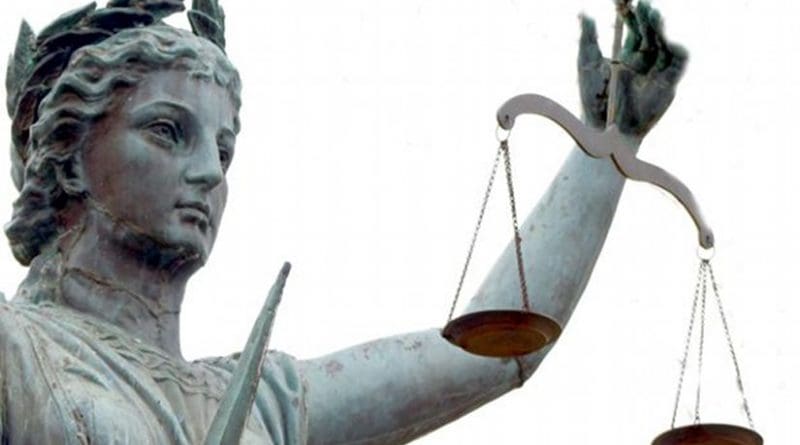US Criminal Justice System Fuels Poverty Cycle, Says HRW
The United States government at all levels should act to prevent the criminal justice system from punishing poverty and further impoverishing the poor, the Criminal Justice Policy Program (CJPP) at Harvard Law School and Human Rights Watch said. In particular, authorities should not rely on fines and fees to pay for government programs because they disproportionately hurt the poor.
The United Nations special rapporteur on extreme poverty, Philip Alston, highlighted the practice during a recent visit to the country. In his report, he says that “the criminal justice system is effectively a system for keeping the poor in poverty while generating revenue.” He is scheduled to present his findings to the UN Human Rights Council in Geneva on June 22, 2018.
“In the United States, many jurisdictions rely on fees and fines for revenue for the criminal justice system and for other programs,” said Mitali Nagrecha, director of the National Criminal Justice Debt Initiative at CJPP. “This has led to an increase in fees assessed across the country and more aggressive collection tactics, including time in jail. Given the makeup and size of our criminal justice system, this unsurprisingly places a disproportionate burden on large numbers of poor people and communities of color.”
In his report, Alston describes the burden fines and fees place on poor people charged with low-level infractions and the harsh collection tactics that are often designed in ways that trap people in poverty. He cites the common practice of suspending drivers’ licenses when people fail to pay their criminal justice debt. He notes that this “is a perfect way” to ensure that the poor, unable to pay their debts, are also “unable to earn a living that might have helped to pay the outstanding debt.”
These practices appear to have evolved from governments’ desire to reduce taxation to support criminal justice in favor of increasing fines and fees for offenders. However, that approach is highly regressive; it tends to place the greatest financial burden on the low-income people whose cases make up the largest share of many courts’ dockets.
Alston also addresses the money bail system, used in almost every US state, which requires people to pay to secure their release from jail prior to trial. Across the US, almost half a million presumptively innocent people sit in jail daily because they cannot afford bail. Some of the devastating consequences include loss of jobs, disruption of child care, inability to pay rent, and deeper destitution, Alston said.
Money bail also creates pressure on the poor who want to return home to plead guilty, leaving them with a criminal record solely because they could not afford bail, research has found, though Alston did not address this aspect in his report.
Even the US’ most widely used alternative to money bail concerns Alston, who warns that pretrial risk assessment tools that rely on formulas may replicate existing societal racial and class biases, but project a false veneer of objectivity. These tools often lack transparency and are subject to political manipulation, which raises serious due process concerns, he says. A Human Rights Watch analysis has found that risk assessment tools have the potential to be as harmful as the system it seeks to replace.
Alston also cautions that privatization of the criminal justice system can harm poor people. He cites bail bond corporations, which charge high fees and interest, and private supervision and collection companies, which charge additional fees and often rely on arrest warrants to secure payment.
In advance of the special rapporteur’s report, CJPP and Human Rights Watch submitted testimony to him describing how fees and fines and money bail create a two-tiered system of justice and keep people trapped in poverty.
Alston also condemned the US practice of enforcing criminal laws against people who lack housing for conduct directly related to their situation, like sleeping in public places. He describes how cities are jailing or fining the poorest people for offenses rooted in their homeless status, saying he observed aggressive enforcement of this kind in Los Angeles and San Francisco.
Such practices have often been favored over policies such as preserving affordable housing or providing health services to address the problem of poverty. Alston endorsed legislation known as “The Right to Rest Act,” being considered in several western states, which would prevent cities from criminalizing actions by people linked to their lack of housing and force governments to find rights-respecting solutions.
State and local governments, with support from the federal government, should respond to the special rapporteur’s findings by working together to remedy the two-tiered system of justice, CJPP and Human Rights Watch said. State and local governments should initiate reforms to address these problems.
“The special rapporteur addresses the many ways the US criminal justice system punishes people for their poverty and helps entrench their poverty further,” said Komala Ramachandra, senior business and human rights researcher at Human Rights Watch. “Justice should not be blind to how it harms the poor, and federal and state governments should work with reform movements to fix these problems.”

